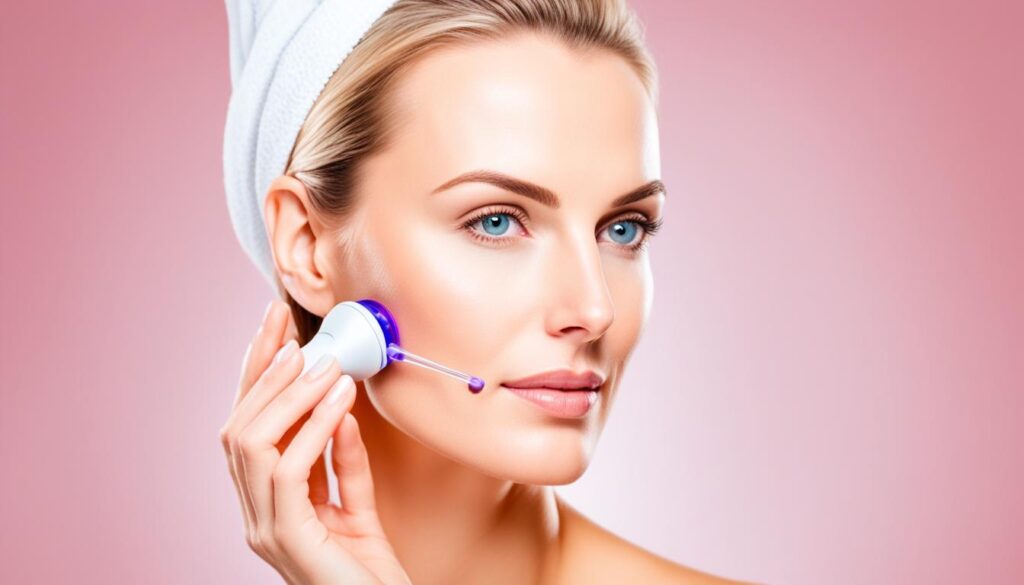Uncategorized
The Ultimate Guide to At-Home Derma Rolling for Collagen Production
Learn everything you need to know about at-home derma rolling in this guide. Derma rolling, or microneedling, is a top skincare method. It can make your skin feel smoother, lessen fine lines and wrinkles, and boost your body’s collagen production. You’ll be ready to try derma rolling at home by the end, and your skin will thank you for it.
Key Takeaways
- Derma rolling, or microneedling, is a powerful skincare technique that can boost collagen production and improve skin texture.
- At-home derma rolling can be an effective and affordable way to incorporate this treatment into your regular routine.
- Proper preparation and technique are essential for safe and effective at-home derma rolling.
- Derma rolling can help reduce the appearance of fine lines, wrinkles, and other signs of aging by stimulating the body’s natural collagen production.
- Following a comprehensive post-rolling skincare routine is crucial for maximizing the benefits of at-home derma rolling.
What is Derma Rolling?
Derma rolling, or microneedling, is a way to rejuvenate the skin. It uses a roller with small needles to make tiny holes in your skin. These small “injuries” help your skin heal by producing more collagen and elastin. These are proteins that make your skin look young and full.
Understanding Microneedling
Microneedling means using a small tool with fine needles on your skin. This action creates tiny channels on the skin’s surface. These channels make it easier for skincare products to go into your skin. The process also starts the skin’s repair process, making it produce more collagen and elastin. That’s why your skin looks smoother, and fine lines and wrinkles are less noticeable. In the end, your skin looks more glowing.
Benefits of Derma Rolling
Derma rolling has many benefits for your skin. It can make acne scars fade, decrease sun damage marks, and even your skin tone. Doing derma rolling often helps your skin absorb other skincare products better. This means those products work deeper into your skin.
Safety Precautions
Though derma rolling can be safe and helpful, it’s crucial to be careful. Make sure your roller is clean and not used on damaged skin. You should also use the shortest needle length at first and slowly try longer ones. Longer needles may harm your skin. And, if you’re worried about your skin’s reaction to derma rolling, it’s best to talk to a dermatologist.
Preparing for At-Home Derma Rolling
Start your at-home Derma Rolling by preparing your skin and tools. First, pick the right Derma Roller. Choose needles that match your skin type, usually between 0.5mm and 1.5mm long. Be careful not to use a roller with longer needles. They might hurt your skin instead of helping it.
Cleansing and Sterilizing
After choosing the right Derma Roller, make sure your skin and roller are cleaned and sterilized>. This is very important to avoid infections and have safe home Derma Rolling sessions.
First, cleanse your face with a mild, non-irritating cleanser. This removes dirt and oil from your skin. Rinse your face with warm water. Then, gently pat your skin dry with a soft towel.
Next, sterilize your Derma Roller. Soak it in disinfectant for 10 minutes. This step kills any harmful bacteria. After sterilizing, rinse it with water and let it air dry.
Cleaning and sterilizing your skin and tools right is crucial. It is key to a successful and skin-rejuvenating Derma Rolling session at home.
Step-by-Step Guide to At-Home Derma Rolling
Ready to start your at-home derma rolling? First, put on some numbing cream to your skin, if you want. Let it rest for 20-30 minutes. This step can make the rolling process less painful.
Applying Numbing Cream (Optional)
Numbing cream is great for making derma rolling easier, especially if your skin is sensitive. Use a little cream on the areas you’ll roll, about the size of a pea. Leave it for 20-30 minutes before you start the technique.
Proper Rolling Technique
Roll the derma roller across your skin slowly, with a bit of pressure. Begin at the forehead, then move down. Next, roll from the cheeks to the nose, and from the chin up. Don’t forget the parts around your eyes and lips. Do this 2-3 times gently to avoid too much skin irritation.
Post-Rolling Skincare Routine
Once your derma rolling is done, treat your skin with care. Cleanse your face with a mild cleanser. Then, use a hydrating serum or moisturizer to soothe and nourish your skin. For the next day, don’t use harsh products or exfoliants. Let your skin heal and recover without these.
Derma Rolling (Collagen)
Derma rolling does wonders for your skin by boosting collagen. Collagen is key for making skin firm, soft, and full. But, as we get older, our collagen decreases, leading to wrinkles and sagging.
Understanding Collagen Production
Collagen is the most common protein in our bodies. It’s in our skin, bones, and tissues. It keeps skin looking young by giving it strength and a plump glow. Yet, as time goes by, we make less collagen, which shows in skin aging signs.
How Derma Rolling Boosts Collagen
Derma rolling makes controlled tiny injuries on the skin. This prompts our body’s healing response to make more collagen and elastin. Over time, this process can enhance skin, smooth out lines, and fade scars. Doing derma rolling at home can help keep your skin looking young and healthy.


